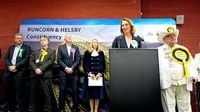In a stunning turn of events, Reform UK has emerged as a significant challenger to the traditional dominance of British politics, overtaking Labour in the recent Runcorn and Helsby by-election. On May 2, 2025, Reform's candidate Sarah Pochin clinched victory by a mere six votes, marking a dramatic swing of 17.4 percentage points from Labour. This election not only highlighted the growing disillusionment with the established parties but also underscored the potential for Reform to reshape the political landscape.
The initial count had Labour ahead by ten votes, but following a recount, Reform was declared the winner, sending shockwaves through Labour ranks. The party's leader, Nigel Farage, expressed his satisfaction, noting that this victory demonstrated Reform's capacity to challenge Labour in a manner similar to how they had previously defeated several Conservative candidates in the last general election.
Farage's optimism was further bolstered by Reform's success in other elections, including winning the Greater Lincolnshire Mayoralty with former Conservative Education Minister Andrea Jenkyns. Additionally, Reform is on the cusp of taking control of Staffordshire County Council, which could further solidify its position as a major political force.
These results have raised alarms within the Labour Party, as MPs are now more concerned about Reform's rise than a potential resurgence of the Conservatives. Despite this, Keir Starmer's leadership remains secure, although the recent election outcomes have diminished the initial enthusiasm following his general election victory.
The Conservative Party, led by Kemi Badenoch, is facing severe repercussions from the electorate. In a series of local elections, the party has been punished for its record, which includes fourteen years of low growth, public sector austerity, and perceived administrative incompetence. Voters have increasingly turned to Reform and the Liberal Democrats, with many Conservative supporters feeling disenchanted.
In the aftermath of the local elections, Badenoch finds herself in a precarious position. The Conservatives have lost significant ground, facing major losses in Staffordshire and losing control of Northumberland Council. Should the party fail to regain control of the councils it is defending, Badenoch's leadership could be in jeopardy within a few months.
The local elections have also revealed a troubling trend for Labour. While they managed to retain some mayoralties, they did so with significantly reduced margins. For instance, Labour's Ros Jones was re-elected as mayor of Doncaster by just 698 votes, while Karen Clark won in North Tyneside by only 444 votes. These narrow victories indicate that Labour is not as secure as it once seemed, especially with Reform nipping at its heels.
Labour's attempts to counter Reform's influence have not been very effective. The party's strategy of adopting rhetoric similar to Farage's on issues like immigration has alienated its traditional supporters. This approach has not only failed to attract voters from Reform but has also disillusioned Labour's base, prompting them to seek alternatives.
In the Runcorn by-election, Labour's loss of its 49th safest seat has sparked internal discussions about the party's direction. Some Labour politicians are already calling for a reset, recognizing that mimicking Farage's policies could lead them down a similar path of electoral decline as the Conservatives.
As the political landscape shifts, the Liberal Democrats and Greens are also poised to capitalize on the Conservatives' struggles. The Liberal Democrats are optimistic about winning a majority in Oxfordshire and could potentially unseat Conservatives in Wiltshire and Shropshire. Meanwhile, the Greens are eyeing significant gains in areas like Warwickshire and Worcestershire.
These developments suggest that the political dynamics in the UK are rapidly changing. The traditional two-party system is being challenged, with Reform UK establishing itself as a credible alternative for disillusioned voters. As Reform continues to gain traction, both Labour and the Conservatives must reassess their strategies to avoid further losses.
Political analysts are closely monitoring these trends, noting that the results of the recent elections indicate a significant shift in public sentiment. With Reform's rise, the established parties are being put on notice, and the coming months will be crucial in determining whether they can adapt to this new political reality.
In conclusion, the recent local elections have marked a turning point in British politics, with Reform UK threatening to disrupt the status quo. As voters increasingly turn their backs on Labour and the Conservatives, the future of the political landscape remains uncertain. Both parties must navigate this new terrain carefully to retain their relevance and connection with the electorate.





